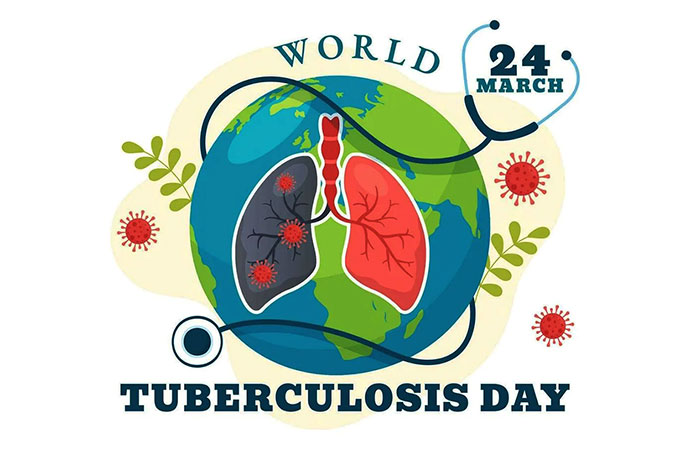Global

Image: Collected
Funding Crisis will Weaken the Efforts of Supporting People with Tuberculosis
Today is the World Tuberculosis (TB) Day, commemorating the date in 1882 when Dr. Robert Koch announced his discovery of the bacillus mycobacterium causing tuberculosis. Mycobacterium tuberculosis, also known as Koch's bacillus, is a species of pathogenic bacteria in the family mycobacteriaceae and the causative agent of tuberculosis, a highly contagious disease, that is a significant cause of ill health and one of the top 10 causes of death worldwide, ranking even higher than HIV/AIDS. The theme for World TB Day 2025, observe on March 24th every year, is "Yes! We Can End TB: Commit, Invest, Deliver," emphasizing the need for sustained commitment, financial investment, and effective action to eliminate tuberculosis.
The international community must urgently step up and deliver the necessary support to avoid the devastating impacts on the lives of people with TB in low-income countries following the announcement of severe aid cuts by the foreign partners and donors, particularly linked to the shut down on US foreign aid by the recent directives of President Donald Trump. The life-saving services of huge number of health centers as well as projects that relied on US funding will suffer tremendously. Donor countries must take immediate steps to bridge the funding shortfalls to prevent an already precarious situation from escalating further.
Every year, the World Tuberculosis Day reminds us about the destructive impacts of tuberculosis on communities worldwide. TB remains a crucial health threat for many countries, especially in middle and low-income countries. To effectively implement TB control programs, low and middle-income countries seriously lack the financial and human resources. The day emphasizes the urgent need for global collaboration to remove this preventable and treatable disease and motivates governments, health organizations and individuals to invest in strengthening health systems with the ultimate goal of ending TB by 2030.
Tuberculosis, one of the world's deadliest infectious diseases primarily affects the lungs, although it can also affect the other body parts. It spreads through the air when an infected person sneezes or coughs, making it extremely infectious. TB excessively affects ill-protected populations, including those living in overcrowded conditions, in poverty and with weakened immune systems. According to the World Health Organization, with an estimated 10 million people falling ill and 1.5 million dying from the disease every year. TB burden is heavy in Southeast Asia and Africa, where resources for diagnosis, prevention and treatment are limited.
The global rise in the number of new people falling ill with tuberculosis was 10.8 million and 8.2 million people were newly diagnosed with TB in 2023. This is the highest number for a single year since WHO started to compile data from all countries in the mid-1990s. Worldwide, a total of 436,805 cases of TB among people living with HIV were notified in the same year. Among them, 55% of people were men, 33% were women and 12% were children and young adolescents. Only five countries accounted for 56% of worldwide TB incident cases. These countries are India (26%), Indonesia (10%), Chine (6.8%), Philippines (6.8%) and Pakistan (6.3%). Bangladesh was accounted for 3.5% of global incident cases of TB in 2023.
The current challenges in tuberculosis are Multidrug-resistant TB (MDR-TB) remains a public health threat. Only about 2 in 5 people with drug resistant TB accessed treatment in 2023. Global efforts to combat TB have saved an estimated 79 million lives since the year 2000. The median cost per person treated for TB in 2023 (from a provider perspective) was US$ 783 for drug-susceptible TB. On the other hand, the median cost per person treated for drug-resistant TB (from a provider perspective) was US$ 4877 in 2023.
At the second UN high-level meeting on TB in September 2023, Member States committed to mobilizing at least US$ 22 billion per year for TB prevention, diagnostic and treatment services by 2027, and US$ 35 billion per year by 2030; a target of US$ 5 billion per year by 2027 was set for investment in TB research.
Funding available for TB prevention, diagnostic and treatment services in low and middle-income countries falls far short of the global targets set at the 2023 UN high-level meeting. In 2023, the total funding available was US$ 5.7 billion, equivalent to only 26% of the target of reaching US$ 22 billion per year by 2027.
The main source of international donor funding for TB is The Global Fund. Its share of the total amount of international donor funding reported by National TB Programs to WHO was 76%. Key findings include that the United States Government is the largest contributor of funding to The Global Fund and also the largest bilateral donor for TB; overall, it contributes about 50% of international donor funding for TB.
On behalf of millions of people affected by TB, total 1,188 individuals and organizations from around the world including BRAC and HEED from Bangladesh wrote an open letter in 2023 to the global leaders to increase investment for the diagnosis, treatment and research on tuberculosis, one of the world's deadliest infectious diseases. TB is a matter of social and economic justice. This disease disproportionately affects the poor and marginalized communities, leading to major consequences such as social isolation, stigma, job loss, catastrophic household costs, mental distress and also reduces worker productivity. So, the governments of middle and low-income countries like Bangladesh should increase investment to fight TB effectively.
Bangladesh is facing a dual burden of disease, with an increasing incidence of noncommunicable diseases alongside a resurging prevalence of communicable diseases like TB. Tuberculosis (TB) remains the most common cause of morbidity and mortality, and thus represents a significant public health threat.
Under the Mycobacterial Disease Control unit of the Directorate-General of Health Services, the National Tuberculosis Control Program (NTP) is working with a mission of eliminating TB from Bangladesh. During the 4th Population and Health Plan (1992-98), NTP started its field implementation through adopting WHO guided Directly Observed Treatment, Short Course (DOTS) strategy. Prior to 1993, TB services in Bangladesh were mainly curative. In collaboration with GoB, BRAC has started to expand DOTS services nationwide in 1994 and has been the principal recipient (PR) of the Global Fund to Fight TB since 2004. Along with BRAC, Damien Foundation, HEED, RDRS, TLM Int., LAMB, SMC, PIME Sisters as well have been working as sub-recipient under the unified umbrella of NTP for achieving the goal of ending TB epidemic in the country.
In Bangladesh, incident and notification data are available (2000 - 2023) and it carried out some studies on TB. These are Standards and Benchmark Assessment (2019 and 2022), National TB Prevalence Survey (2015) and National Drug-Resistance Survey (2011 and 2019). Bangladesh Government has installed number of modern and high precision tools and machineries to ensure high quality services for the TB diagnosis and treatment at free of cost. Countrywide, it is managing and operating one national reference laboratory, four regional reference laboratories, 44 TB clinics and 07 TB hospitals. Moreover, it operates indoor and outdoor TB services at all medical colleges and hospitals, district sadar hospitals and upazila health complexes.
In 2023, the incident rate of TB in Bangladesh was 221 per 100,000 population, whereas the global incident rate was only 134 in the same year, which was 87 more incident cases in the country per 100,000 people. The total numbers of notified cases were 307,561, which is 82% of total incident cases in 2021 in Bangladesh. Here, the Incident Cases are those cases of people who are developing with TB. On the other hand, the Notified Cases are those cases of people who are diagnosed as TB, which means confirmed TB patient.
The National Strategic Plan (2021-2025) describes key interventions and activities that will enable the NTP to achieve the End TB Strategy's Milestones for 2025 (75% reduction in tuberculosis deaths and 50% reduction in tuberculosis incidence rate) and targets for 2035 (95% reduction in tuberculosis deaths and 90% reduction in tuberculosis incidence rate). There is a general lack of awareness and sensitization amongst healthcare providers about childhood TB in Bangladesh. Also, lack of community knowledge and stigma associated with the disease play key roles in the low detection rate of the disease in the country.
The Global Fund provides 76% of all international financing to fight TB worldwide. The Global Fund allocated total US$437.9 million for Bangladesh to sustain progress against TB and strengthen health and community systems across the country over the 2019-2023 period whereas Bangladesh Government allocated US$109.4 million during the same period, which were about 20% of total funding to fight tuberculosis in the country. In 2022, the Global Fund allocated total US$216.2 million to fight TB but in 2023 the Global Fund allocated only US$57 million, which were about 74% fund less than the previous year. It was the clear indication that we need to concentrate at our own funding rather relying on foreign funding.
On World Tuberculosis Day 2025, the expert pulmonologists globally highlight the urgent need for preventive care, early detection, and highly advanced treatment strategies to fight TB. They recommend vaccination drives, awareness campaigns, and obtainable healthcare solutions to decrease the burden of tuberculosis. The common signs and symptoms of TB include: fever and night sweats, coughing up blood or mucus, persistent cough (lasting more than 3 weeks), unexplained weight loss, fatigue and weakness as well. TB is curable with proper treatment and care. Through healthy diet, good hygiene, proper ventilation and wearing masks in high-risk areas as well as strengthening the immune system, we can prevent tuberculosis. Health is the non-negotiable foundation for everything else like career, relationships, dreams as well.
Nicholas Biswas is a Development Practitioner and the Awardee of United Nations Population Fund (UNFPA) Media Award for the Years of 2007 and 2008 who can be reached at nicubiswas@gmail.com

























Leave a Comment
Recent Posts
Populism strikes again
So it is official now - the Bangladesh national team will not be trave ...
Beijing urges Washington to fo ...
China on Thursday reacted to China-related remarks by the US Ambassado ...
The European Union and the Mercosur bloc of South Am ..
New US Ambassador to Bangladesh raises concern over ..
Gold prices in Bangladesh surged past the Tk 250,000 ..
What is Trump's 'Board of Peace' and who will govern ..